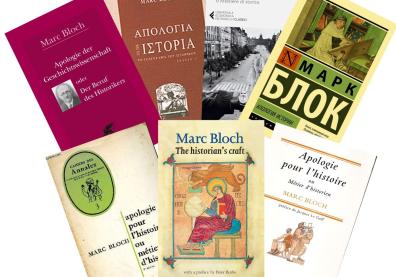Apologie pour le métier d'historien: Quoi de neuf? or Historical experience and its epistemological sublimation

In 2026 Marc Bloch will enter the Pantheon. His contribution to the renewal of historical practice is considerable, and there are many reasons to reflect on his life and reread his work. From a strictly historiographical point of view, he is, along with Lucien Febvre, the founder of the Annales school and the history of mentalities, with the intellectual posterity that we know. But Bloch is also one of the few historians to have left us systematic reflections on the practice of history. Thus, between the practice of history and the reflexivity of the researcher, the experience of history fits in. Indeed, his life was marked by the two world wars, as a soldier, a member of the Resistance and as a simple individual living through troubled times. And Bloch is fully aware of this. From the trenches of the Great War, he detected the phenomenon of spreading false rumors and wrote a book about it. What a strange coincidence with today's post-truth world! During the dark years of 1939-1943 - when he was successively a defeated soldier, an academic excluded from teaching as a Jew, then reinstated as a professor in Montpellier, and finally a member of the Resistance movement's general board - he wrote his magnificent Apologie pour l'histoire, a posthumous work published in 1949 by his alter ego, Lucien Febvre, to whom he dedicated the manuscript. A few lines from this dedication suffice to evoke in us this in-between historical experience and its intellectual sublimation:
"Long have we fought together, for a broader and more human history. The common task, as I write, faces many threats. Not through any fault of our own. We are the temporary vanquished of an unjust destiny. The time will come, I am sure, when our collaboration can truly resume, public as in the past and, as in the past, free."
Taking the example of Marc Bloch as its starting point, this study day is not intended as a tribute to the man he was, nor as an exegesis of his work. Rather, this meeting invites us to something akin to a role-playing game, and reposes Marc Bloch's question: are we in a position to propose new apologies for the historian's craft?
Program
9h-9h15: Welcome
9h15-10h15: First session
Moderator: Madalina Vartejanu-Joubert
Aviezer Tucker, "Historiographic Epistemology"
Catherine Larochelle, "Faire l'histoire en temps d'éblouissement : pour une épistémologie inquiète"
Hizky Shoham, "Reading the Apologie as a Conventionalist Theory of Meaning"
10:15-10:30 am: Discussion
10:30-11:10 am: Session Two
Moderator: Aviezer Tucker
Geoffrey Herman, "Is a History of the Jews of Sasanian Babylonia still possible? Method and Mentality"
Sascha Auerbach, Hannah Richter, "Slavery, Public Health, and the Biopolitical State in the Eighteenth-Century Atlantic World"
11:10-11:30 a.m.: Discussion and coffee break
11:30 a.m.-12:30 p.m.: Third session
Moderator : Cristina Ion
André Bienvenu, "Transdisciplinarity and history: Reconstructing the epistemology of the past in the light of other sciences"
Jonathan Elukin, "The idea of race in modern historiography"
Noël Bonneuil, "Seriation and dynamics: Marc Bloch meets Henri Poincaré? "
12:30-12:45: Discussion
12:45-14:30: Lunch
14:30-15:30: Fourth session
Moderator: Catherine Larochelle
Anne Viguier, "De l'étude de cas à l'histoire globale: les échelles d'analyse en question"
Juan A. Fernandez Meza, "Response and omission: the category of 'bystanders' and the historian's craft"
Taline Ter Minassian, "Marc Bloch and Russia: reflexive returns on the historian's craft in the new "time of troubles"
3:30-3:50 pm: Discussion
3:50-4:50 pm : Fifth session
Moderator: Taline Ter Minassian
Edgars Engizers, "History-writing behind the invisible frontlines of Russo-Ukrainian war"
Thaïs Bihour, "Aborder les violences de guerre en milieu pédagogique: une pratique entre enjeux et défis"
Raghda Saad, "L'Écho de Marc Bloch en FLE: la littérature comme outil critique face aux récits identitaires et à la "post-vérité""
16h50-16h30: Discussion and coffee break
16h30-17h30: Sixth session
Moderator: Nicolas Pitsos
Laurent Angard, "Le récit entre fiction et histoire : Marc Bloch à l'école d'Alexandre Dumas"
Juan Luis Fernandez Vega, "Touching words : science, narrative, and rhetoric in history"
Davide Mogetta "An Exercise in "Off-Reading". Baxandall, Collingwood, and the (Art) Historian's Craft"
17:30-18:00: Discussion
The symposium proceedings will be followed by an aperitif dinner